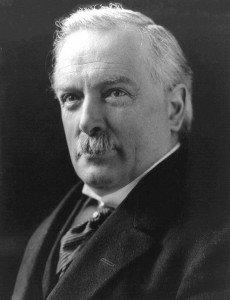David Lloyd George – 1917 Speech on Supreme War Council
Below is the text of the speech made by David Lloyd George, the then Prime Minister, in the House of Commons on 14 November 1917.
The best way for me to answer this question is to read to the House the actual terms of the agreement between the French, Italian, and British Governments for the creation of a Supreme War Council for the Allies.
1. With a view to the better co-ordination of military action on the Western Front, a Supreme War Council is created, composed of the Prime Minister and a Member of the Government of each of the Great Powers whose Armies are fighting on that front. The extension of the scope of the Council to other fronts is reserved for discussion with the other Great Powers.
2. The Supreme War Council has for its mission to watch over the general conduct of the War. It prepares recommendations for the decision of the Governments, and keeps itself informed of their execution, and reports thereon to the respective Governments.
3. The General Staffs and Military Commands of the Armies of each Power charged with the conduct of military operations remain responsible to their respective Governments.
4. The general War plans drawn up by the competent military authorities are submitted to the Supreme War Council, which, under the high authority of the Governments, ensures their concordance, and submits, if need be, any necessary changes.
5. Each Power delegates to the Supreme War Council one permanent Military Representative, whose exclusive function is to act as technical adviser to the Council.
6. The Military Representatives receive from the Government and the competent military authorities of their country all the proposals, information and documents relating to the conduct of the War.
7. The Military Representatives watch day by day the situation of the Forces, and the means of all kinds of which the Allied Armies and the Enemy Armies dispose.
8. The Supreme War Council meets normally at Versailles, where the permanent Military Representatives and their Staffs are established. They may meet at other places as may be agreed upon, according to the circumstances. The meetings of the Supreme War Council will take place at least once a month.
From the foregoing it will be clear that the Council will have no executive power, and that the final decisions in matters of strategy and as to the distribution anti movements of the various Armies in the field will rest with the several Governments of the Allies. There will be, therefore, no Operations Department attached to the Council. The permanent Military Representatives will derive from the existing Intelligence Departments of the Allies all the information necessary in order to enable them to submit advice to the Supreme Allied Council. The object of the Allies has been to set up a central body charged with the duty of continuously surveying the field of operations as a whole and, by the light of information derived from all fronts and from all Governments and Staffs, of co-ordinating the plans prepared by the different General Staffs, and, if necessary, of making proposals of their own for the better conduct of the War. Should the House desire an opportunity of discussing this important subject and my Paris speech, the Government would propose set aside Monday next for the purpose.

